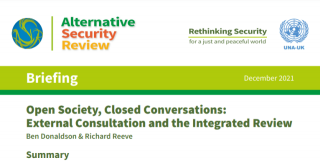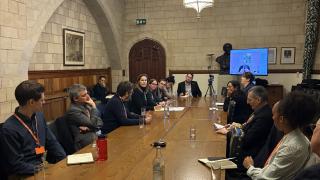
On 9 December UNA-UK published a briefing paper written jointly with Rethinking Security on external consultation conducted as part of the UK’s 2020-21 Integrated Review of Security, Defence, Development and Foreign Policy.
The briefing, Open Society, Closed Conversations: External Consultation and the Integrated Review, explores how the Integrated Review engaged with people and organisations outside of the UK government, and compares it to the approaches used in previous national security reviews. It asks how well the Integrated Review stands up to the principle of openness that the document itself identifies as a positive characteristic of UK society and a fundamental principle of the UK’s ‘Global Britain’ persona on the international stage.
Key findings from the briefing:
- External engagement appears to have been included in the Integrated Review as an afterthought and rushed through in contravention of established government guidelines. Public outreach was extremely limited and resulted in less than one quarter the number of inputs as the previous (2015) review.
- While proactive engagement with external expertise increased on 2015 by at least 50%, the rationale for consultees’ inclusion appears ad hoc and skewed towards like minded institutions experts. This is highly likely to have entrenched and validated pre-existing assumptions.
- Notable by their exclusion were those with greatest experience of global insecurity, including NGOs with international development, humanitarian and peacebuilding expertise; those representing vulnerable communities, and organisations based in the Global South.
- Despite the stated ambition to challenge Whitehall assumptions, the narrow framing of the public consultation denied any opportunity to challenge the underlying approach to security.
- Key strategic decisions were repeatedly taken outside of the Integrated Review process and without external consultation, including the abolition of DFID and major spending decisions on defence and international development.
- Despite pledges to develop its ‘public engagement capacity’ to support implementation of the Review, it is not clear if, and if so, how, the government intends to develop a meaningful conversation with the public on security policy.
Click here to read the report.
Read more:
- Click here to read UNA-UK on the Integrated Review
- See Rethinking Security’s civil society-led review of the UK’s approach to security: the Alternative Security Review






